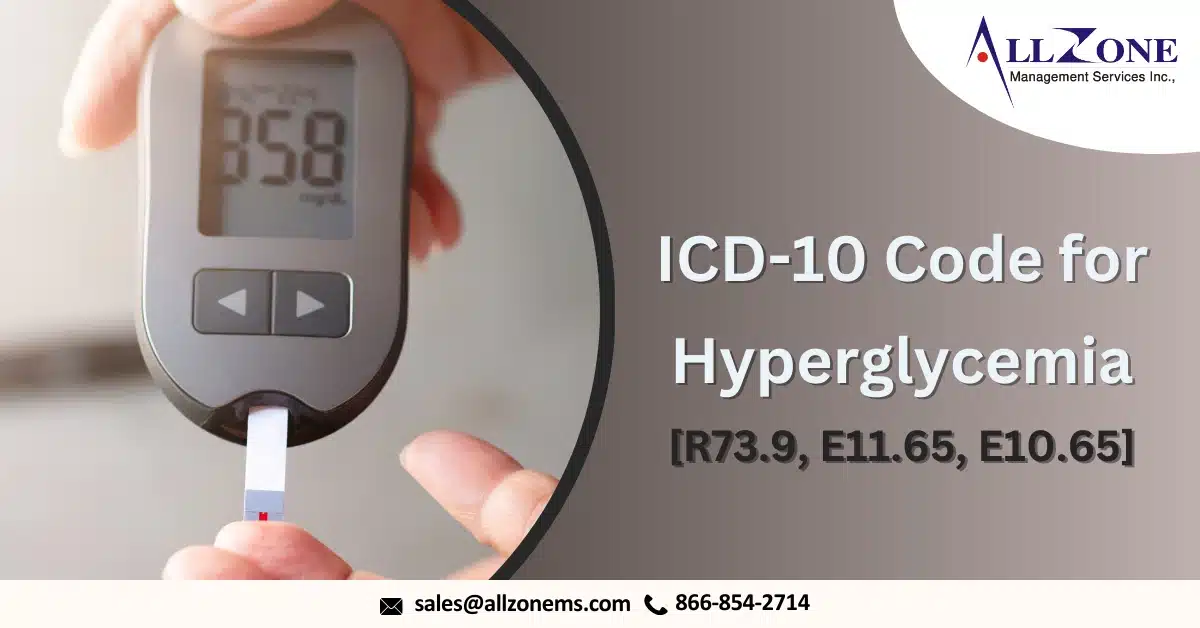Hyperglycemia, or high blood sugar, is a common condition that requires accurate diagnosis and precise medical coding for proper reimbursement. In the world of healthcare billing and coding, the ICD-10 code for hyperglycemia plays a critical role in ensuring claims are submitted correctly, reducing denials, and maintaining compliance. For providers and healthcare organizations, understanding how to code hyperglycemia accurately is essential for both patient care documentation and financial performance.
At Allzone Medical Coding Company, we specialize in helping healthcare providers streamline their coding processes. By leveraging expert medical coders, advanced technology, and years of industry expertise, we help reduce errors and optimize reimbursement outcomes.
In this blog, we’ll explore the ICD-10 code for hyperglycemia, discuss best practices for coding, review the common causes of hyperglycemia, and analyze the impact of proper coding on healthcare organizations.
What Is the ICD-10 Code for Hyperglycemia?
In ICD-10-CM, the code most often used for hyperglycemia is:
- 9 – Hyperglycemia, unspecified
This code is used when hyperglycemia is documented but the underlying condition (such as diabetes mellitus) is not specified. If the provider identifies diabetes as the cause, a more specific code should be assigned, such as:
- 65 – Type 2 diabetes mellitus with hyperglycemia
- 65 – Type 1 diabetes mellitus with hyperglycemia
Correct selection depends on documentation. Coders must carefully review provider notes to determine if the hyperglycemia is related to a chronic condition (like diabetes) or if it is an isolated, unspecified event.
Accurate usage of ICD-10 codes for hyperglycemia ensures compliance, avoids downcoding or upcoding, and prevents unnecessary claim denials.
Best Practices for Coding Hyperglycemia
- Rely on Clear Provider Documentation: Coders should confirm whether the hyperglycemia is acute, chronic, or related to another condition like diabetes. Documentation is the foundation for coding accuracy.
- Use the Most Specific Code Available: Whenever possible, use a specific ICD-10 code that links hyperglycemia to its cause, such as diabetes mellitus or another endocrine disorder. This reduces ambiguity in claims.
- Stay Updated with ICD-10 Changes: The ICD-10 code set is updated annually. Coders must stay informed about revisions or new codes that may affect hyperglycemia reporting.
- Avoid Common Coding Errors: A frequent mistake is assigning R73.9 when a more precise code (like E11.65 for type 2 diabetes with hyperglycemia) is available. Another error is misclassifying hyperglycemia as hypoglycemia.
- Leverage Expert Coding Support: Partnering with a trusted medical coding company like Allzone ensures coding accuracy. Certified coders are trained to interpret documentation correctly and reduce error rates.
Common Causes of Hyperglycemia
Hyperglycemia occurs when the body has too much glucose in the bloodstream. For coding purposes, it’s helpful to understand the underlying causes, since these often determine which ICD-10 code should be used.
- Diabetes Mellitus – The most common cause. Patients with type 1 or type 2 diabetes often experience high blood sugar due to inadequate insulin or poor glucose control.
- Medications – Certain drugs, such as corticosteroids, can trigger hyperglycemia.
- Stress or Illness – Severe infections, surgery, or trauma may cause temporary spikes in blood sugar.
- Endocrine Disorders – Conditions like Cushing’s syndrome or hyperthyroidism may lead to elevated glucose levels.
- Lifestyle Factors – Poor diet, lack of exercise, and obesity are common contributors to persistent hyperglycemia.
For medical coders, knowing the cause helps determine whether to use R73.9 (unspecified hyperglycemia) or a more condition-specific code.
Impact of Accurate ICD-10 Coding for Hyperglycemia
- Financial Reimbursement: Payers require precise ICD-10 codes to approve claims. Incorrect or unspecified coding may result in delays, denials, or reduced reimbursement.
- Compliance and Audit Readiness: Accurate coding ensures compliance with CMS and private payer regulations. Misuse of unspecified codes can trigger audits or penalties.
- Improved Patient Care: Precise coding ensures accurate clinical documentation, which informs treatment decisions and continuity of care. For example, coding diabetes with hyperglycemia provides more detail than coding unspecified hyperglycemia.
- Denial Prevention: Denials are costly for providers. One of the most common reasons for denial is lack of specificity in ICD-10 coding. Proper hyperglycemia coding reduces this risk.
- Operational Efficiency: By outsourcing medical coding to experts like Allzone Medical Coding Company, healthcare organizations save time, reduce administrative burden, and focus more on patient care.
How Allzone Medical Coding Company Helps with ICD-10 Hyperglycemia Coding
At Allzone, we provide end-to-end medical coding services that eliminate errors, enhance compliance, and maximize revenue. Our certified coders are well-versed in ICD-10 coding guidelines and specialize in coding complex conditions like hyperglycemia.
Key benefits of partnering with Allzone include:
- Expertise in ICD-10 Coding : Our team ensures hyperglycemia is coded correctly, whether standalone or associated with diabetes.
- Denial Reduction Strategies: We identify and fix recurring issues that cause denials, such as using unspecified codes unnecessarily.
- Technology-Driven Solutions: AI-powered coding tools streamline coding accuracy and reduce turnaround times.
- Compliance-Focused: We adhere to HIPAA regulations and maintain strict data security standards.
- Customizable Services: Whether you’re a hospital, physician practice, or multispecialty group, we tailor our coding solutions to meet your needs.
Conclusion
The ICD-10 code for hyperglycemia plays a crucial role in accurate medical documentation, compliance, and reimbursement. Whether coding R73.9 for unspecified hyperglycemia or E11.65 for type 2 diabetes with hyperglycemia, coders must carefully review documentation and apply the most specific code available.
By following best practices, understanding the common causes of hyperglycemia, and recognizing the impact of accurate coding, healthcare providers can reduce denials and improve revenue cycle performance.
At Allzone Medical Coding Company, we provide the expertise and support you need to handle ICD-10 coding challenges effectively. From hyperglycemia to complex multi-system conditions, our professional coders ensure accuracy, compliance, and maximum reimbursement.

